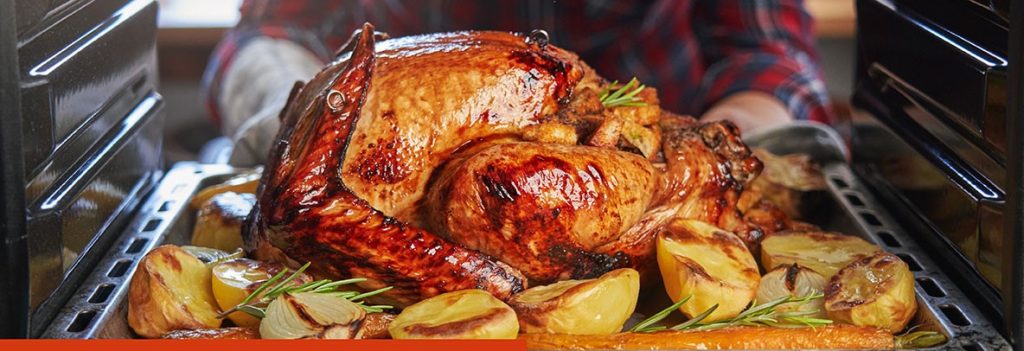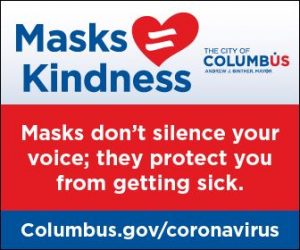By Nuwayla Mazrui-Helmrich
This year, in the shadow of the Covid-19 pandemic, Ohioans have had to contend with postponing, reimagining, or altogether fore-going events that have traditionally brought family and friends together. From graduations and weddings to funerals and memorials, the safety restrictions under which we’ve lived for the better part of the year because of the coronavirus pandemic have made planning travel and family gatherings a near impossible venture.
And now the holiday season is fast approaching. On November 26th, the single most traveled holiday in American tradition will be upon us. For many, the pandemic has been an extremely stressful and isolating time. So, the opportunity to commune with loved ones may be just too difficult to refuse, a sentiment illustrated by the fact that 80% of Americans say that they will be celebrating Thanksgiving with their families despite Covid-19.
As if the situation weren’t already grim, we’re currently experiencing the highest surge in Covid-19 infections since the beginning of the coronavirus spread, setting a new record for the highest number of cases in a day. Franklin and Tuscarawas Counties are near a Level 4 classification on the Ohio Health Advisory Board System, indicating the most severe exposure and spread, prompting Governor Mike DeWine and the CDC to stress the importance of celebrating the holiday with the lowest-spread threshold possible.
Earlier this week, Gov. DeWine introduced new restrictions in response to the surge in Covid infections in the state, announcing a 21-day curfew between 10 pm and 5 am and limiting both indoor and outdoor social gatherings.
On the other hand, Dr. Anthony Fauci, director of the National Institute of Allergies and Infectious Diseases, urged the American public to consider cancelling the holiday altogether. Additionally, public health experts warned that small gatherings are now considered a growing source of community spread, where previously this was attributed primarily to large, public meetings.
So, what should Ohioans consider when making this decision for themselves and their families? First, when it comes to the Covid-19 pandemic, it’s important to remember that there is no eliminating risk; there is only reducing it. Experts say begin by assessing the risk level of your household. Is a member of your family an elderly individual, immunocompromised, sick, or considered high-risk in any way?
You and your family should also consider some pertinent questions to see if there’s more that you can do to mitigate your risk further. Can you, for example, have a virtual Thanksgiving this year?
We’ve learned and adapted to socializing virtually in many ways through the year. Can your Thanksgiving dinner be held outdoors? Can it be a tiny and quick gathering?
One of the most overlooked factors for Covid-19 spread is time; the longer you spend with an infected person, the more likely the virus is to be transmitted. If you have family traveling out of town, can your guests arrive early enough to quarantine beforehand? And is everyone attending on the same page in terms of commitment to observing COVID prevention measures?
Lately, we’ve seen more and more health officials use the swiss cheese model to illustrate utilizing different protection layers to create a more substantial barrier against the risk of infection for you and your family. The swiss cheese model is a fundamental principle used in risk management and analysis, traditionally for accident causation.
Still, it can be applied to the management of hazards in any situation, like the coronavirus. Each layer of prevention has holes in it, like a slice of swiss cheese – meaning it’s not foolproof – but if you line up the layers, then each additional layer strengthens the barrier. In this case, the layers represent social distancing, masks, hand hygiene, ventilation, surface cleaning, and so forth. The idea is that the more layers of risk intervention you apply, the more you lower the risk of infection.
Whatever you decide, keep in mind that the restrictions we’ve been observing to combat Covid-19 spread should be applied with even more vigor throughout the holiday season. Whether you’re celebrating Thanksgiving, Hannukah, Diwali, or Kwanzaa, keep yourself and your family safe by celebrating these cherished holidays responsibly. It may look different from celebrations in previous years but doing everything we can to ensure our family and friends’ health and safety is something we can all be thankful for this year.
For more information on recommendations regarding this holiday season, please visit the Center for Disease Control at CDC.gov, and for updates on Covid-19 developments in Ohio, travel advisories, and public health orders, visit coronavirus.ohio.gov.



































Leave a Reply
You must be logged in to post a comment.